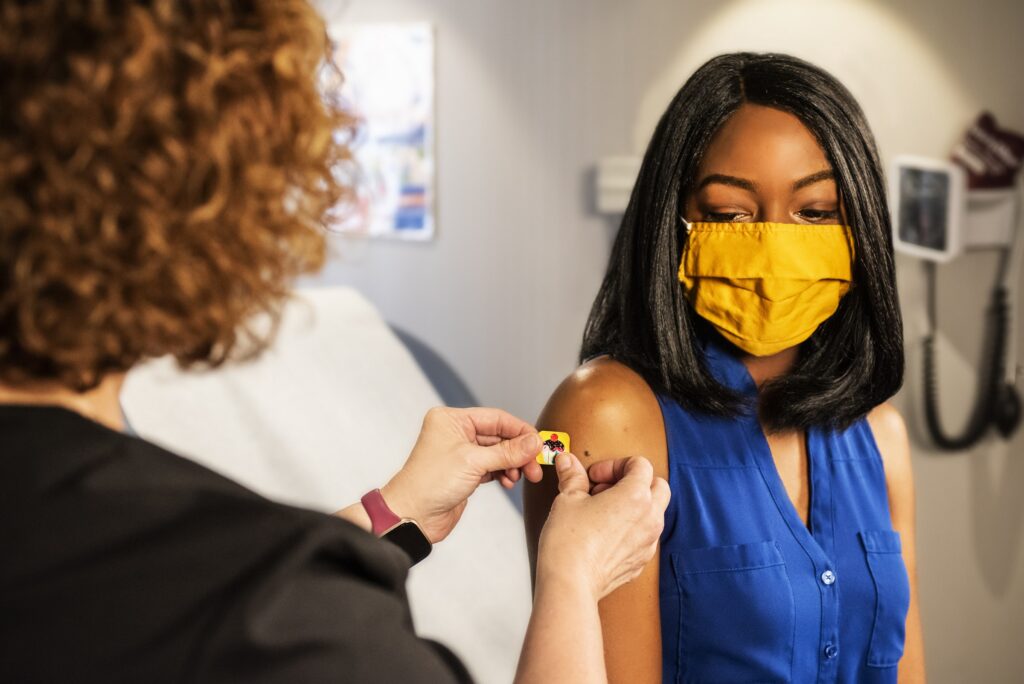National Women’s Health Week
May 11, 2022
Prioritizing your health – both physical and mental – has never been more important. Over the past few years, many women have put off taking care of their general health and wellness needs. They have adjusted their daily routines, including the way they connect with family and friends. The combination has led to serious health problems for some women.
May 8-14, 2022 is National Women’s Health Week (NWHW), a focused time for women and girls to reflect on their individual health needs and take steps to improve their overall health.
Forward Focus: Achieving Healthier Futures Together
Achieving Better Health During NWHW
Whether you continue your current activities or find new ones, now is a great time for all women and girls to focus on better health, especially those with underlying health conditions, such as hypertension, diabetes, obesity, cardiovascular and respiratory conditions, and women 65 years and older. National Women’s Health Week is also a great time for family, friends, and the greater community to take action to support women and help them achieve the best health possible.
Protect Yourself Against COVID-19
Get vaccinated and stay up to date with a COVID-19 booster shot. There are conditions that continue to make you more likely to get very sick from COVID-19:
- Pregnant and Recently Pregnant People
- People with Certain Medical Conditions
- Older Adults
- People Who Are Immunocompromised (or have a weakened immune system)
Anyone age 5 or older can get a COVID-19 vaccine from ¡HealthCore Clinic. We also have booster shots and 3rd doses available. You can schedule your COVID-19 vaccine appointment in advance, or we accept walk-ins every Thursday from 2-5 PM.

Schedule Your Annual Physical
This is a great time to schedule your annual physical or other health appointments. Talk to your doctor, nurse, nurse practitioner, and/or physician assistant about the following.
- The COVID-19 vaccine and any vaccines that you may have missed during the pandemic.
- Preventive care such as PAP smears, mammograms, bone density scans, stress tests, cholesterol screenings, blood pressure screenings, physical exams, and other preventive health screenings that you may have missed during the pandemic. Not sure what they are? Click here:
- Health screenings for women ages 18 to 39
- Health screenings for women ages 40 to 64
- Health screenings for women aged 65 and older
- If you have missed any recommended check-ups or vaccinations during COVID-19.
- If stress, anxiety, or depression is getting in the way of your daily activities.
- If you are feeling sad, overwhelmed, or are unable to eat or sleep for longer than two weeks after the birth of your baby. You may be experiencing postpartum depression.
¡HealthCore Clinic has a diverse women’s health team including OB-GYN Care, Family Medicine providers, Wesley Family Medicine residents, and a Certified Nurse-Midwife (CNM).

Maintain a Healthy Lifestyle
Maintaining a healthy weight can lower the risk of heart disease, stroke, diabetes, and high blood pressure. It can also lower the risk of many different cancers. Healthy weight is different for everyone, but it’s important to know what a healthy weight is for you. Talk to your medical provider about your health goals and create a plan specific for you.
Monitor alcohol intake and avoid illicit drugs, including drugs that are not prescribed to you.
Look out for your lungs: Quit smoking and vaping. Smoking weakens your lungs and puts you at a much higher risk of having serious health complications, especially if you have COVID-19.

Be Physically Active
Being physically active is one of the most important actions you can take at any age to improve your health. Did you know? The HHS Physical Activity Guidelines for Americans define physical activity generally as any movement that enhances health. That means activities such as walking, playing with children, gardening, and cleaning can count as physical activity.
- Create a weekly activity plan with the goal of getting your heart beating faster through 150 minutes of moderate-intensity aerobic exercise each week.
- Break your activity into small sessions. Go for a 15-minute or 30-Minute walk during your breaks. Daily exercise improves cardiovascular health, and Vitamin D provided by the sun will help boost your immune system.
- Incorporating muscle-strengthening activity, including lifting weights or using resistance bands, will help prevent sarcopenia, or muscle loss due to aging and immobility.
- Find a routine to fit your needs based on your age, stage of life, and abilities. If you are pregnant, there are ways that you can exercise safely but it is important to talk to your doctor before starting or changing your physical activity.

Eat a Healthy Diet
Eat well-balanced meals and snacks as a way to nourish your body from the inside out. Heart-healthy eating involves choosing certain foods, such as fruits and vegetables, while limiting others, such as saturated and trans fats and added sugars.
- Explore tips at nutrition.gov for eating at home and in restaurants to ensure balanced, weight-healthy meals. Speak with a member of your health & wellness team at ¡HealthCore Clinic to determine what foods and Vitamins work best for you.
- It’s important to ensure you are getting enough vitamins in your diet. Vitamin D is a nutrient your body needs for building and maintaining healthy bones. The body can only absorb calcium when vitamin D is present. Vitamin D’s anti-inflammatory, antioxidant and neuroprotective properties support immune health, muscle function, and brain cell activity. Foods such as milk, yogurt, orange juice, cereals, oily fish such as salmon, rainbow trout, canned tuna, and sardines are all great sources of Vitamin D.
- Calcium is also important, especially for bone health across the lifespan. The best sources of calcium are dairy products, including milk, yogurt, cheese, and calcium-fortified beverages such as almond and soy milk. Calcium is also found in dark-green leafy vegetables, dried peas and beans, fish with bones, and calcium-fortified juices and cereals.

Practice Self-Care For Your Mental Health
- Make a list of small acts of self-care that you can do daily.
- Check in to see if you need support or help dealing with daily life.
- Stay connected with family and friends.
- Connect with your community-or faith-based organizations.
- Make time to unwind and focus on activities you enjoy.
- Support caregivers in your life. If you are a caregiver, take time for yourself.
- Pay attention to changes in your mood
Need help? At HealthCore, our culturally appropriate mental health and substance abuse services are designed to reduce stigma and provide a comfortable and safe environment for the management of anxiety, depression, trauma, and behavioral support for other mental health and medical diagnoses.
If you or anyone you know is experiencing changes in thinking, mood, behavior, and/or thoughts of self-harm, reach out for help:
SAMHSA’s National Helpline – 1-800-662-HELP (4357)
SAMHSA’s National Helpline is a free, confidential, 24/7, 365-day-a-year treatment referral and information service (in English and Spanish) for individuals and families facing mental and/or substance use disorders.

Find Healthy Ways To Manage Stress
Build a toolbox full of healthy ways to cope with stress. Simple, everyday actions such as scheduling quiet time for meditation, yoga, and reading can reduce stress. Spending a few minutes in nature, getting out to exercise, or playing a favorite song can help you feel grounded.
Life can be stressful—you may feel stressed about performance at school, traumatic events (such as a pandemic, a natural disaster, or an act of violence), or a life change. Everyone feels stress from time to time.
What is stress? Stress is the physical or mental response to an external cause, such as having a lot of homework or having an illness. A stressor may be a one-time or short-term occurrence, or it can happen repeatedly over a long time.
What is anxiety? Anxiety is your body’s reaction to stress and can occur even if there is no current threat.
If that anxiety doesn’t go away and begins to interfere with your life, it could affect your health. You could experience problems with sleeping, or with your immune, digestive, cardiovascular, and reproductive systems. You also may be at higher risk for developing a mental illness such as an anxiety disorder or depression.
So, what are the differences between stress & anxiety?
| Stress | Both Stress and Anxiety | Anxiety |
|---|---|---|
| Generally is a response to an external cause, such as taking a big test or arguing with a friend. Goes away once the situation is resolved. Can be positive or negative. For example, it may inspire you to meet a deadline, or it may cause you to lose sleep. | Both stress and anxiety can affect your mind and body. You may experience symptoms such as: Excessive worry Uneasiness Tension Headaches or body pain High blood pressure Loss of sleep | Generally is internal, meaning it’s your reaction to stress. Usually involves a persistent feeling of apprehension or dread that doesn’t go away, and that interferes with how you live your life. Is constant, even if there is no immediate threat. |
When your body’s stress response system is activated long-term, you could be at higher risk for a variety of issues, including digestive problems, weight gain, high blood pressure, heart disease, stroke, and more. ¡HealthCore Clinic is here to help.

Create Healthy Sleep Habits
About 1 in 3 adults do not regularly get the recommended amount of sleep they need to protect their health, and about 50 to 70 million Americans have a sleep disorder. Sleep deficiency can lead to physical and mental health problems, including heart disease and depression, as well as injuries, loss of productivity, and even a greater likelihood of death.
Follow a routine for going to sleep and going to bed and waking up at the same time each day – even on weekends – to improve your sleep habits. Try to get at least 7 hours of sleep.
If you think you may have a sleep problem, track your sleep in a sleep diary. Sharing the diary with your health care provider can help them diagnose a potential sleep problem.

Seek Help if You or Someone You Know is Experiencing Domestic Violence
Seek Help With Domestic Violence
Violence has long-term effects on health outcomes for women and their families, including emotional trauma, lasting physical impairment, and chronic health problems. In addition, violence is a significant, and often overlooked, contributor to maternal mortality.
Get help and support. The National Domestic Violence Hotline is a 24/7 confidential service that supports victims and survivors of domestic violence. The hotline can be reached:
- By phone: 1-800-799-7233(SAFE)
- By text: Text LOVEIS to 22522
- Online chat: thehotline.org and select “Chat Now”
Highly trained, experienced advocates offer support, crisis intervention information, educational services, and referral services in more than 200 languages. The website provides information about domestic violence, online instructional materials, safety planning, and local resources.